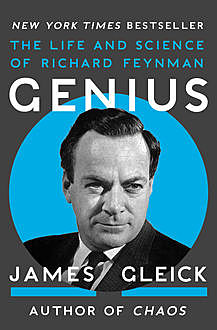
en
Läs i våra appar:
iOS
·Android
Genius: The Life and Science of Richard Feynman
Den här boken är inte tillgänglig just nu
885 trycksidor
- Ursprunglig publicering
- 2011
- Utgivningsår
- 2011
- Förlag
- Open Road Media
Citat
- Andre Franciscohar citeratför 4 år sedanAfterward demons afflicted the bomb makers. J. Robert Oppenheimer made speeches about his shadowed soul, and other physicists began to feel his uneasiness at having handed humanity the power of self-destruction.
- Stasya Zhar citeratför 6 år sedangists. In his youth he experimented for months on end with trying to observe his unraveling stream of consciousness at the point of falling asleep
- Stasya Zhar citeratför 6 år sedanThere are two kinds of geniuses, the “ordinary” and the “magicians.” An ordinary genius is a fellow that you and I would be just as good as, if we were only many times better. There is no mystery as to how his mind works. Once we understand what they have done, we feel certain that we, too, could have done it. It is different with the magicians. They are, to use mathematical jargon, in the orthogonal complement of where we are and the working of their minds is for all intents and purposes incomprehensible. Even after we understand what they have done, the process by which they have done it is completely dark
fb2epub
Dra och släpp dina filer
(upp till fem åt gången)

